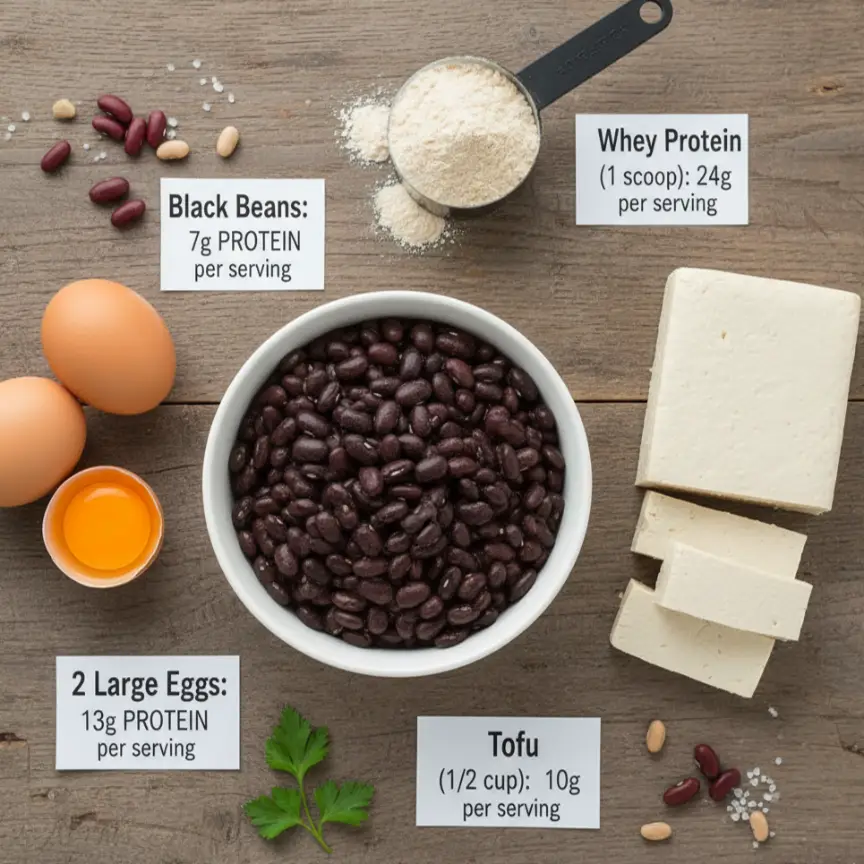How much protein do you need? The answer depends on your body weight, training goals, and overall health. Protein isn’t just about building muscle — it fuels recovery, supports fat loss, and keeps you fuller for longer. With so much conflicting advice, this article breaks down the science and provides clear, practical steps for setting your daily protein intake.

Table of Contents
Understanding Daily Protein Intake (How Much Protein Do You Need)
Why Protein Matters for the Body
Protein is the foundation of muscle, enzymes, and hormones. Without enough, recovery slows, strength gains stall, and energy drops. Unlike carbs and fats, your body doesn’t store protein, so you must eat it daily.
General Guidelines for Protein Intake per Day
The RDA is just 0.8 g/kg — enough to prevent deficiency, but too low for athletes. Research shows active individuals need 1.2–2.2 g/kg depending on goals. That means a 70 kg person may need anywhere from 84–154 grams daily.
Protein for Muscle Growth
Protein Intake per kg for Muscle Gain
If your goal is muscle growth, studies recommend 1.6–2.2 g/kg of body weight. Beginners usually need less, while advanced lifters benefit from the higher end.

Best Timing and Distribution for Muscle Protein Synthesis
Eating protein evenly across meals maximizes growth. Aim for 20–40 grams of high-quality protein per meal. Post-workout shakes may help recovery.
👉 Related: Protein Timing and Recovery
Protein Intake for Weight Loss
How Much Protein Per Day to Lose Weight
High-protein diets reduce hunger, protect lean muscle, and boost metabolism. For fat loss, aim for 1.6–2.4 g/kg. That means a 70 kg person may need up to 168 grams daily.
Protein Calculator for Weight Loss
To calculate:
Body weight (kg) × 1.6–2.4 g = protein target
👉 Related: Protein for Weight Loss vs Muscle Gain
Using a Protein Calculator
Protein Calculator for Daily Needs
Different activity levels require different intakes:
| Activity Level | Protein Range (g/kg) |
|---|---|
| Sedentary | 0.8–1.0 g/kg |
| Active | 1.2–1.6 g/kg |
| Strength Training | 1.6–2.2 g/kg |
👉 Related: Best Protein Powder for Beginners
Protein Intake Calculator for Different Goals
For fat loss: multiply weight × 1.6–2.4 g
For muscle gain: weight × 1.6–2.2 g
For maintenance: weight × 1.2–1.6 g
Food Sources and Protein Quality
How Much Protein in an Egg and Common Foods
A large egg has 6–7 grams of protein. Chicken breast gives 30 grams per 100 g, tofu offers 10 grams per 100 g, and whey protein scoop averages 20–25 grams.
👉 Related: Best High-Protein Foods vs Supplements
Whey vs. Plant Protein for Different Needs
Whey digests fast and has a complete amino acid profile. Plant proteins may require combining (e.g., rice + pea). Both can support muscle growth.
👉 Related: Whey vs Plant Protein
Protein Intake for Different Populations
Protein for Women vs. Men
Women often fear “bulking up” with protein, but research shows both genders benefit equally from 1.6–2.2 g/kg.
👉 Related: Protein Supplements for Women vs Men
Protein Needs for Different Diets (Vegan, Keto, etc.)
Vegans may need slightly higher intakes due to lower digestibility. Keto diets rely heavily on protein from animal sources.
👉 Related: Protein for Different Diets
Protein Myths and Misconceptions
Common Myths About Protein
- Myth: High protein damages kidneys (not true for healthy people).
- Myth: Eating more protein automatically builds muscle (training is key).
👉 Related: Protein Myths Debunked
How to Read Protein Supplement Labels
Check protein per scoop, amino acid profile, and certifications. Avoid unnecessary fillers.
👉 Related: How to Read Protein Supplement Labels
Practical Application and Tracking

How to Track Daily Protein Intake
Use apps like MyFitnessPal or Cronometer. Estimate serving sizes (100 g chicken ≈ 30 g protein).
Building a Protein-Rich Meal Plan
Sample day for muscle gain:
- Breakfast: 3 eggs + oats + whey (35 g protein)
- Lunch: Chicken, rice, veggies (40 g)
- Snack: Greek yogurt + nuts (20 g)
- Dinner: Salmon + potatoes + broccoli (45 g)
For weight loss, keep protein high but lower total calories.
Conclusion
Protein needs aren’t one-size-fits-all. For muscle growth, stick to 1.6–2.2 g/kg. For fat loss, go slightly higher. Focus on whole food sources first, use supplements strategically, and track intake with a protein calculator. With the right daily protein intake, you’ll see better results in the gym and beyond.
FAQs
Protein per day to build muscle?
1.6–2.2 g/kg body weight.
Protein calculator?
Multiply weight in kg × goal range.
Protein intake calculator?
Same principle, tailored to fat loss, muscle gain, or maintenance.
Protein per kg for muscle gain?
1.6–2.2 g/kg recommended.
How much protein in an egg?
6–7 grams per large egg.
How much protein per day to lose weight?
1.6–2.4 g/kg body weight.
How much protein per day to gain muscle calculator?
Body weight × 1.6–2.2 g = target protein.
Protein calculator for weight loss?
Body weight × 1.6–2.4 g depending on activity.
Visit my Instagram account for more
